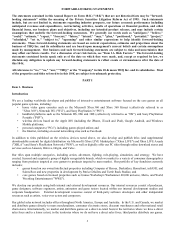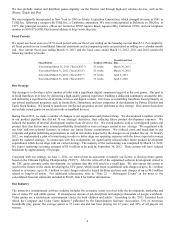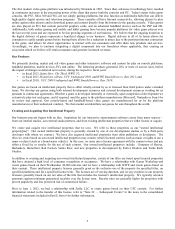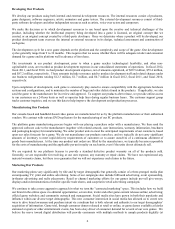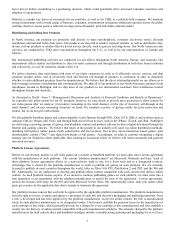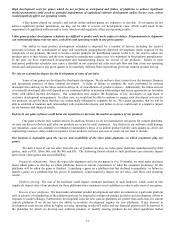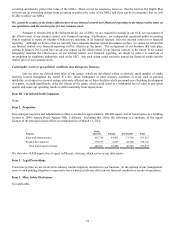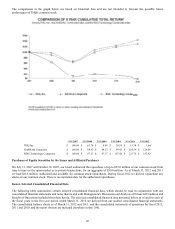THQ 2012 Annual Report Download - page 20
Download and view the complete annual report
Please find page 20 of the 2012 THQ annual report below. You can navigate through the pages in the report by either clicking on the pages listed below, or by using the keyword search tool below to find specific information within the annual report.12
High development costs for games which do not perform as anticipated and failure of platforms to achieve significant
market penetration could result in potential impairments of capitalized software development and/or license costs, which
would negatively affect our operating results.
Video games played on consoles and certain online-enabled games are expensive to develop. If our games do not
achieve significant market penetration, we may not be able to recover our development costs, which could result in the
impairment of capitalized software and/or costs, which would negatively affect our operating results.
Video game product development schedules are difficult to predict and can be subject to delays. Postponements in shipments
can substantially impact our net sales, cash flows and operating results in any given quarter.
Our ability to meet product development schedules is impacted by a number of factors, including the creative
processes involved, the coordination of large and sometimes geographically-dispersed development teams required by the
complexity of our products, the need to localize certain products for distribution outside of the U.S., the need to refine our
products prior to their release, and the time required to manufacture a game once it is submitted to the platform manufacturer.
In the past, we have experienced development and manufacturing delays for several of our products. Failure to meet
anticipated production schedules may cause a shortfall in our expected net sales and cash flow and thus cause our operating
results and cash position in any given quarter to be materially different from expectations given our reduced product line-up.
We rely on external developers for the development of some of our titles.
Some of our games are developed by third-party developers. We do not have direct control over the business, finances
and operational practices of these external developers. A delay or failure to complete the work performed by external
developers has and may in the future result in delays in, or cancellations of, product releases. Additionally, the future success
of externally-developed titles will depend on our continued ability to maintain relationships and secure agreements on favorable
terms with skilled external developers. Our competitors may acquire the businesses of key developers or sign them to
exclusive development arrangements. In either case, we would not be able to continue to engage such developers' services for
our products, except for those that they are contractually obligated to complete for us. We cannot guarantee that we will be
able to establish or maintain such relationships with external developers, and failure to do so could result in a negative impact
on our business and financial results.
Defects in our game software could harm our reputation or decrease the market acceptance of our products.
Our game software may contain defects. In addition, because we do not manufacture our games for console platforms,
we may not discover defects until after our products are in use by retail customers. Any defects in our software could damage
our reputation, cause our customers to terminate relationships with us or to initiate product liability suits against us, divert our
engineering resources, delay market acceptance of our products, increase our costs or cause our net sales to decline.
Our business is dependent upon the success and availability of the video game platforms on which consumers play our
games.
We derive most of our net sales from the sale of products for play on video game platforms manufactured by third
parties, such as PS3, Xbox 360, and the Wii and DS. The following factors related to such platforms can adversely impact
sales of our video games and our profitability:
Popularity of platforms. Since the typical development cycle for our games is 9 to 36 months, we must make decisions
about which games to develop on which platforms based on current expectations of what the consumer preference for the
platforms will be when the game is finished. Launching a game on a platform that has declined in popularity, or failure to
launch a game on a platform that has grown in popularity, could negatively impact our net sales, cash flows and operating
results.
Platform pricing. The cost of the hardware could impact consumer purchases of such hardware, which could in turn
negatively impact sales of our products for these platforms since consumers need a platform in order to play most of our games.
Success of new platforms. We must make substantial product development and other investments in a particular platform
well in advance of introduction of the platform and may be required to realign our product portfolio and development efforts in
response to market changes. Furthermore, development costs for new console platforms are greater than such costs for current
console platforms if we do not have the ability to re-utilize development engines for new platforms. If any increase in
development costs are not offset by higher net sales, operating results will suffer and our financial position will be harmed. If
the platforms for which we develop new software products or modify existing products do not attain significant market



